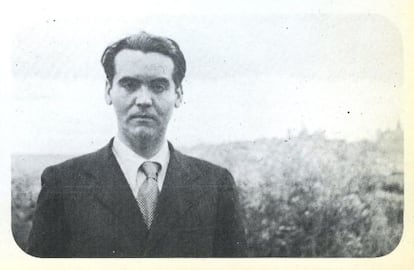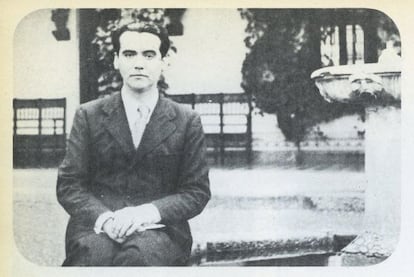Lorca murdered after “confessing,” says Franco-era police report
Document written 29 years after his death describes arrest and killing of Granada poet

Federico García Lorca was murdered “having confessed” to his alleged crimes, according to a report written by Franco-era police 29 years after the Spanish poet’s death in 1936.
The document, to which the Cadena SER radio network has had access, does not specify the content of the alleged confession. Dated July 9, 1965, it describes the writer as a “socialist” and “freemason belonging to the Alhambra lodge,” who engaged in “homosexual and abnormal practices.”
The police themselves admit that the account of Lorca’s death is rather confusing
The report details the arrest of the Granada-born poet, whose remains have yet to be found, in the home of his friends the Rosales brothers in August 1936, just after the outbreak of Spain’s Civil War. He had been staying there out of fear following two police searches of his own home. The officers surrounded the house and nearby streets before carrying out the arrest. The document states that the poet’s friends tried to intervene on his behalf with the military operations commander.
The police themselves admit that the account of Lorca’s death is rather confusing. After his arrest, he was taken by car to the “vicinity of the place known as Fuente Grande,” along with another detainee about whom no other details are provided.

He was then “shot after having confessed, and was buried in that location, in a very shallow grave, in a ravine” around two kilometers to the right of the Fuente Grande. The place is “very difficult to find,” the report admits.
The document was written by Granada police headquarter’s third regional social investigation unit following a June 1965 request by French Hispanist Marcelle Auclair, who was searching for information about his friend Lorca, the SER network reports. Auclair first addressed his request to the Spanish Embassy in Paris, who passed it on to then-Foreign Minister Fernando María Castiella.
In turn, Castiella sent a letter to interior chief Camilo Alonso Vega in which he said he was in favor of responding to the request. His message also mentioned Information and Tourism Minister Manuel Fraga, who had also been informed of the facts.
“I think it extremely advisable to look over the matter and find out whether we can or cannot open our archives about the García Lorca episode,” Fraga had said, according to Castiella’s letter.
Granada police were thus commissioned to write the report, though Auclair never himself received any response nor saw the result of his request, according to the SER network.
Lorca biographer Ian Gibson highlights the significance of the document given how it strips apart the version of events supplied by the Franco dictatorship about the poet’s death.
“The report they asked for is conclusive,” he told EL PAÍS. “It demonstrates that it was not a street killing, that he was taken out by the civil government to be murdered. They themselves say it.
“What I most like is when Camilo Alonso Vega tells Castiella that ‘it’s best not to stir things up’,” the Irish-born Hispanist added.
Gibson explained that the dictatorship never recognized its involvement in Lorca’s death, which became a major irritation abroad. “Up until Franco’s death, Lorca’s murder remained a problem for the regime,” he said.
Tu suscripción se está usando en otro dispositivo
¿Quieres añadir otro usuario a tu suscripción?
Si continúas leyendo en este dispositivo, no se podrá leer en el otro.
FlechaTu suscripción se está usando en otro dispositivo y solo puedes acceder a EL PAÍS desde un dispositivo a la vez.
Si quieres compartir tu cuenta, cambia tu suscripción a la modalidad Premium, así podrás añadir otro usuario. Cada uno accederá con su propia cuenta de email, lo que os permitirá personalizar vuestra experiencia en EL PAÍS.
En el caso de no saber quién está usando tu cuenta, te recomendamos cambiar tu contraseña aquí.
Si decides continuar compartiendo tu cuenta, este mensaje se mostrará en tu dispositivo y en el de la otra persona que está usando tu cuenta de forma indefinida, afectando a tu experiencia de lectura. Puedes consultar aquí los términos y condiciones de la suscripción digital.








































